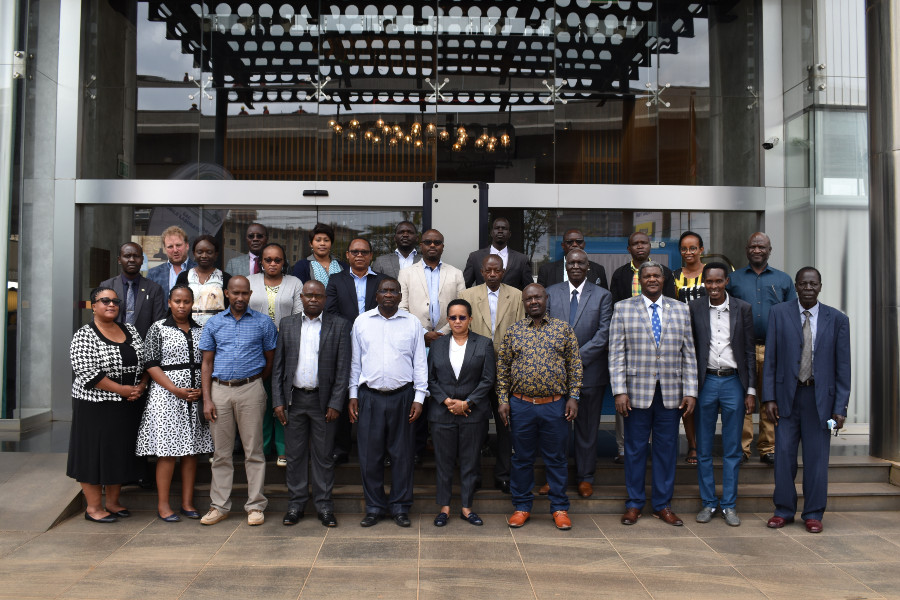
Partner States laud contribution of EAC Mobile Laboratories project in enhancing national Covid-19 response initiatives
East African Community Headquarters, Arusha, Tanzania, 22nd October, 2021: The 9th Regional Steering Committee Meeting of the EAC Regional Network of Public Health Reference Laboratories for Communicable Diseases (EAC – RNPHRL) concluded on Friday, with delegates commending the contribution of the EAC Mobile Laboratories towards regional efforts to mitigate the Covid-19 pandemic.
In his remarks, Dr. John Ndemi Kiiru, Head, Department of Laboratory Services, Ministry of Health, Republic of Kenya observed that the Mobile Laboratories project was a noble initiative that will have a great impact on the lives of the people of East Africa not only in the short term but in the long terms as well. “The Labs have facilitated the Partner States to undertake various initiatives that would have otherwise been impossible to undertake,” he added.
The Regional Steering Committee, that met from 21st to 22nd October, 2021 in Nairobi, Kenya reviewed progress made in the implementation of the pending activities under the first phase of the project, whose implementation was interrupted by the Covid-19 pandemic. The meeting also prioritised activities for the second phase of the project that was launched on 11th June, 2021 at the EAC headquarters in Arusha, Tanzania.
During deliberations, the Steering Committee noted the mobile laboratories under the ERNPHRL-CD project had played a significant role in the Partner States’ efforts in mitigating the Covid-19 pandemic. Collectively, the national Mobile Laboratories reported to have undertaken more than 600,000 Covid-19 tests across the region since their deployment in the Partner States mid last year. In addition, the Mobile Laboratories have played a significant role in reducing the turnaround time from sample collection to dispatch of test results from the initial 3 to 5 days, to the current average of 8 hours, with Uganda reporting the shortest turnaround time of 5.5 hours.
The meeting however noted the urgent need to integrate the project into the existing National Public Health Laboratories and Ministry of Health programmes and existing structures to ensure the sustainability of the Mobile Laboratories framework.
The Steering Committee also reviewed the proposed technical specifications for equipment to be procured under the three-year second phase of the project. The second phase is set to strengthen the capacities of the EAC Partner States to respond to outbreaks of infectious diseases, including bacterial diseases and cross-border epidemics with particular reference to Antimicrobial Resistance (AMR) surveillance in the region.
This phase of the project kicks off as Antimicrobial Resistance has been declared a global health and development threat requiring urgent multi-sectoral action in order to achieve the Sustainable Development Goals (SDGs). The World health Organization (WHO) has declared AMR one of the top 10 global public health threats facing humanity, occasioned by the misuse and overuse of antimicrobials leading to the development of drug-resistant pathogens.
“Antimicrobial Resistance has been identified as a global health security agenda. We note that the second phase of the Project will play a significant role in providing evidence-based statistics to inform policy development, taking into account the liberal prescription of antibiotics in the region,” said Dr. Isaac Kadowa, Assistant Commissioner Health Services, Ministry of Health, Republic of Uganda during the meeting.
The second phase will also entail the procurement of six (6) container-based mobile laboratory units and equipment for bacterial culture and mobile field sequencing/bioinformatics for rapid pathogen identification and AMR testing; consumables, test kits and high clearance all-terrain vehicles for transporting the container-based laboratory and training of the EAC Partner States public health laboratory personnel to the required level of competency to operate the container-based mobile laboratories for Anti-Microbial Resistance (AMR) surveillance among others. To this end, the Steering Committee noted the need for a multi-sectoral approach to fast-track the procurement, customs clearance and deployment of the mobile units in the region.
On awareness creation of the project, the Steering Committee noted effective, integrated and coordinated communication was integral to realizing the objectives of the Project. In this regard, the meeting noted the urgent need to address the information gaps through the development of a comprehensive project communication and advocacy strategy to guide the awareness creation of the project.
Notes to Editors:
The EAC Secretariat signed a 3-year financing agreement with the Federal Government of Germany through the German Development Bank (KfW) on 23rd November 2016 to support the establishment and operationalization of the EAC Regional Network of Public Health Reference Laboratories for Communicable Diseases (EAC – RNPHRL). The purpose of the laboratory network is to strengthen the capacity of Partner States to detect and respond to pathogens of biosafety level 3 and 4 nature (Phase I).
On 11 June, 2021 a 3-year second phase of the project set to further strengthen the capacities of the EAC Partner States to respond to outbreaks of infectious diseases, including bacterial diseases and cross-border epidemics was launched.
For more information, please contact:
Simon Peter Owaka
Senior Public Relations Officer
Corporate Communications and Public Affairs Department
EAC Secretariat
Arusha, Tanzania
Tel: +255 768 552087
Email: sowaka [at] eachq.org
About the East African Community Secretariat:
The East African Community (EAC) is a regional intergovernmental organisation of six Partner States, comprising Burundi, Kenya, Rwanda, South Sudan, Tanzania and Uganda, with its headquarters in Arusha, Tanzania.
The EAC Secretariat is ISO 9001: 2015 Certified